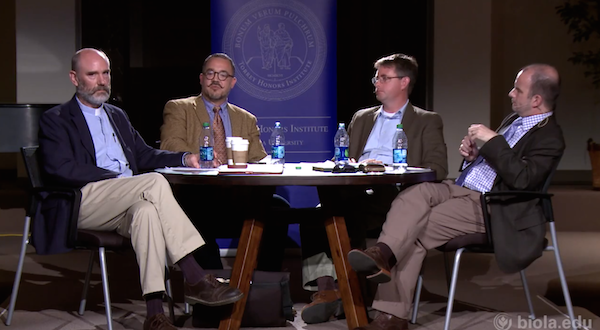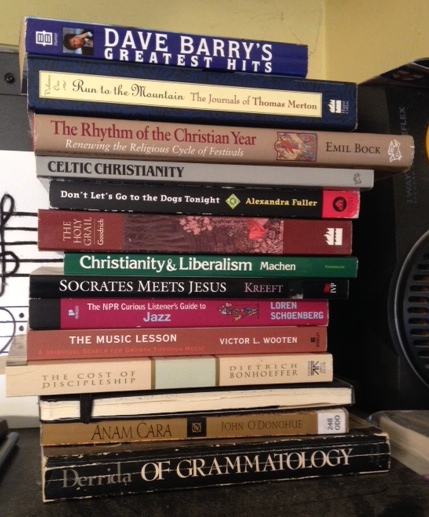I had a wonderful time watching this lecture/debate last night with about 15 friends on a big screen. Yes, that’s what some of us do for fun around here. Yes, there was beer. This is my summation of the conversation with some reflections.
Peter Leithart’s proposed future of Reformed Catholicism tends to elicit swift “yeah, but” reactions from all quarters. The reason is because the scope is so epic and powerful, but the details are not articulated and may contain thousand-year gaps. This leaves plenty of space for the imagination to try and fill in the space and to easily conjure insurmountable obstacles.
In describing his vision during the forum last night, Leithart began with the first day of creation, and how the separated light and darkness was good, but not good enough because on the second day God divides the firmament from the waters below. This narrative continued on with bright new beginnings of impossible births and rescues following long dark nights of exile and persecution. Protestantism’s current hyper-divisionist state is the latest in a string of nights to be followed by an even more mature day – perhaps not “very good” yet, but more good than anything before. It is a grand and sweeping history with a more unified future we are participating in somewhere at this moment. It’s definitely a forest rather than trees angle.
Focusing on just one tree then was critic Fred Sanders. He was friendly, and funny, and very practical – giving many good examples of growth and challenges in his local corner of Christianity. At the end of the day, he is happy with how things are going in his evangelical/Baptist tradition and is eager, as a professor teaching old books, to dig into the church fathers and Reformers to keep us on track. And the end of the day though, he doesn’t see any need to become substantially more catholic than the small amount he already is. The division is a drag sometimes of course, but is more or less necessary and our real problem is with the powers around us that have no fear of God, right? Leithart is kind of off in left field with this fantasy ecumenicism. Jesus doesn’t need that to accomplish all the important stuff in the lives of individuals. As he later suggested in a follow-up piece, uniting the church may “not be as high on His to-do list”.
Finally, splitting the difference somewhere was Carl Truman. He expanded the scope, not to the bold range of millennia, but to a good 500-year time frame, drawing on his understanding of world history, and the original writings of the Reformers. In this he found himself more sympathetic to Leithart’s hope, (he is after all, looking at an entire hillside of trees, to continue that analogy) but unable to reconcile this with his personal, pastoral, on-the-ground experience. At the end of the day, he just can’t see this “Reformed Catholicism” happening. Why? Because quite literally hundreds of millions of Roman Catholics and Orthodox don’t give fig about the most basic doctrines of the church. How can we have unity with so much nominalism? How can I help the hurting people in my congregation by shifting the focus to corporate (catholic) solidarity? (Can’t) It seems that the evangelical focus on the individual and assuring them of their salvation through faith in Christ alone is the only thing that turns people’s lives around. I had better stick with that and the Reformers were and are a good resource for keeping on track with that. The other traditions? Not so much.
A few observations: Leithart’s vision really is crazy. It’s certainly not something human’s could accomplish, for a hundred different reasons, not least the sociological, psychological, and even theological reasons that the critics here presented. But this IS something the Holy Spirit of the living God could accomplish. In fact, He has perhaps done far wilder things in the past. Let us not fear that such a dream is utterly impossible just because we cannot articulate the proper tactics.
Despite the differences, there is more unity going on now that we may admit. One student during the question and answer section essentially said to the panel, “Come on guys, we all know Roman Catholics aren’t really Christians, right?” Across the board he was given a negative answer. It was pointed out that even Calvin considered them part of the body, despite numerous problems. There was no disagreement on that point on the panel. What a difference from what I was consistently told growing up! In my tradition, Rome was only ever a bogey-man and the Orthodox virtually from another planet. Leithart pointed out earlier that despite our differences, Catholics share so much more affinity with Evangelicals now than anyone thought possible just 100 years ago.
Brad Littlejohn, who helped organize the event also pointed out that as far as the secular world is concerned we ARE united! In our commitment to the resurrection and our unwavering opposition to infanticide and homosexual union, our denominational differences melt away. Strangely, we have become auto-united in the eyes of modern west by their own hatred of us. (Talk about a backfire!) This has become increasingly clear in just the past 5 years. Again, there are other forces at work here than our church leaders having a friendly pow wow now and again. Persecution or just marginalization could do wonders to bring us together, and that not of ourselves, but a gift, like everything good.
In conclusion, I want something like Peter’s vision to come to pass. I know everyone out there can articulate a list of perfectly reasonable reasons why it won’t work. So can I. But I think we serve a Creator who can make those obstacles evaporate and who may very well desire his children to have such greater unity.
I desire it. The division of the body is still very unsettling to me. I hope what Peter speaks of is possible. If I use my imagination, I can come up with some ways that it seems to be. I have only a tiny sphere of influence, but I can do something there. I will continue to disavow tribalism, even while openly acknowledging differences. I will start by thinking the best of my brother and sister, rather than to begin with suspicion. Oh, and if I’m going to pick just one thing to fight for, it will be weekly communion. Ha! Hasn’t happened yet. At the same time, I really appreciate Carl Truman’s realism and I think that on the ground, my approach to life and ministry will not end up looking so different than his. There’s only so much of life I can bite off and chew and it is likely I will be like the prophets who “longed to see” Jesus (Matthew 13:17), but died before having a chance to meet him. That’s OK. I can still trust Him because resurrection is built in to this plan.


